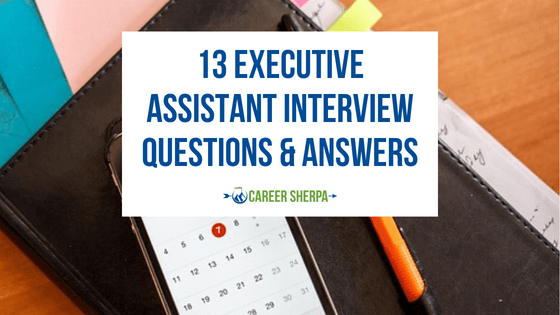There are a number of interview questions for executive assistants that come up all the time. And because of that, it''s important to be ready for them if you''re serious about getting hired for this kind of position.

This list will help you understand what interviewers are looking for when asking these questions, and how you should structure your answers.
What are Executive Assistants?
The job title of executive assistant involves many responsibilities. Many compare these positions to administrative assistants because they provide support to others.
However, what makes an executive assistant different is that you typically work for a single person. That individual is a high-level executive. Assistants assist and support executives, handling tasks that help that person do their job more effectively.
Assistants might train or supervise other staff members, but their core responsibilities revolve around the executive. They take care of menial tasks like answering phones, reading memos, greeting visitors, etc. Depending on the needs of the executive, they may also make travel arrangements, serve as a client liaison, manage complex schedules, and more.
The job is unique and highly varied. What you do as an executive assistant can change from day to day. It all depends on what the executive needs.
Executive Assistant Interview Questions
Because your work as an executive assistant varies, you’ll encounter many specific questions tailored to the executive’s needs. However, several universal questions help interviewers understand your qualifications and capabilities.
Here are a few commonly asked questions you might hear during your interview for an executive assistant position.
1. Would You Consider Yourself Good at Multitasking?
Multitasking is a critical skill if you want to be an executive assistant. This job requires you to juggle several tasks at the behest of your direct supervisor. Your job is mission-critical to the executive, and failing to manage all your responsibilities can affect the person you work for as an assistant.
Interviewers want to know that you’re capable of managing what could be a chaotic work situation. People have different techniques to help them multitask. This executive assistant interview question is a great opportunity to go over yours.
At its core, this question is about time management and your ability to prioritize your work. The goal is to show hiring managers that you’re up to the task.
To do that, think about times in your career when you had several things to do. It could be about a time when you had multiple looming deadlines or a specific job that required strict time management.
Provide real examples and use your experience to illustrate your multitasking competencies.
2. How Do You Respond to Criticism?
Constructive criticism is a natural part of every job. If your supervisors can’t provide criticism, they won''t be able to help you improve and develop your career.
Of course, not everyone handles criticism well. This question comes up because interviewers want to know that you’re not someone who falls apart at the first critical discussion.
No one wants to work with someone who can’t take constructive feedback about their performance or tips to improve. It’s like having to walk on eggshells.
The best way to respond to this executive assistant interview question is to provide examples of how you used criticism and applied it to your personal or professional development journey. Hiring managers love to hear when candidates use constructive criticism to grow.
Reflect on times when you’ve had conversations with managers about your performance. What did you learn, and how did you apply what they said to get better? End on a positive note and highlight the good that came from your ability to accept criticism.
3. Why Do You Want This Position?
This question comes up as a way for interviewers to understand your motivations.
Executive assistant positions are well-paying jobs that don’t require a degree. Are you in this for the money alone? Or are you genuinely interested in the job?
Employers aren’t keen on hiring individuals who are only interested in money. The earning potential is impressive, which could be a big reason many people pursue these positions. But hiring managers want to know that you have other motivations for being there.
They’re looking for candidates who are in this for the long haul and have intrinsic motivations that push them to continue developing their skills.
To respond to this question, think about what made you consider being an executive assistant. Talk about the “ah-ha” moment that made you realize that this was the job for you. Perhaps you like that you’re helping individuals who play an important role in a larger company. Or, it could be because you enjoy administrative responsibilities.
You may even want to talk about how this job plays into your larger goals.
4. How Do You Deal With Stress at Work?
Interviewers ask this question to understand your mental and emotional stamina.
Being an executive assistant appears to be a glamorous job from an outside perspective, but the reality is quite different. It can be a high-stress job with strict deadlines and fast-paced work.
If you’re not up to the task, this is a job that can steamroll over your mental health.
Your goal when responding should be to prove that you know how to manage stress. Discuss stressful situations from your previous jobs and how you dealt with them while maintaining positivity and high productivity levels. You can also touch on some coping strategies you use, such as time management or meditation.
5. What Tools Do You Use to Do Your Job Effectively?
An executive assistant job is multifaceted. You’ll perform a wide range of tasks and need efficiency with many tools. Depending on the job, you may need to understand how to use certain productivity platforms and software.
This question is about understanding your proficiencies with commonly used implements. Hiring managers want to know you are familiar with the tools mentioned in the job posting. Some may have preferred software and devices, but most prioritize your efficiency and productivity above all else.
Some tasks you’ll complete are impossible without the right products and services. For example, managing your executive’s schedule might require shared calendars. Meanwhile, handling meetings and phone calls may need appointment software.
Whatever the case, interviewers want to hear about your methods and capabilities.
Talk about any experience you have with being an executive assistant. Discuss the tools you frequently use and how they benefited you in your job. You should also discuss your willingness to adapt and learn whatever tools employers want you to use.
Lean into your flexibility and focus on your general aptitude with commonly used tools.
6. What’s Your Process for Setting Up a Meeting Between Multiple Parties?
A big part of being an executive assistant is setting up meetings with key decision-makers within your company and the industry. That’s a tall order because it can require a high level of persuasion and professional communication.
When interviewers ask this executive assistant interview question, it’s to gauge your thought process and process you follow. They want to know your steps when reaching out to potentially important people and how you approach setting up crucial meetings. It’s a test of your communication skills and logistical prowess.
Your answer should illustrate how you effectively reach out to others and how you can convince them to meet with your executive around several busy schedules.
When answering, it''s best to use a specific past experience getting multiple people together. Your example doesn’t necessarily have to include executives, but it’s wise to talk about moments that require you to be persuasive.
Walk through your strategy and what you did to schedule meetings successfully. Emphasize how your work made a difference and what positive outcomes came after.
7. How Do You Handle Disagreements at Work?
Many interviewers like to discuss the subject of conflict. Workplace disagreements are common, but they always have the potential to derail progress and productivity.
With executive assistant interview questions like this, you have the opportunity to talk more about how you manage disagreements. It’s your chance to reassure interviewers that you’re not the type who will allow disputes to cause drama in the workplace.
Think about how you typically respond to arguments at work. Focus on a real-world example that shows how you approach those situations calmly and rationally. You must prove that you can handle disagreements maturely without letting it impact your work or professional relationship with your colleagues.
8. What’s Your Process for Making Travel Arrangements?
Another common aspect of the job is making travel arrangements. Executives do a lot of traveling. It may be a mix of domestic and international destinations.
If you’ve ever planned a trip, you know that making travel arrangements can be challenging.
This question aims to test your planning skills. It’s an operational question that requires you to walk interviewers through your processes.
The best approach here is to consider what you do when making travel arrangements. It’s alright if you have no experience doing so for another person. You can talk about personal travel.
The most important thing is showing that you’re competent in this area. Touch on the vendors you use, how you prioritize your details, and how you ensure that travel plans are always comfortable. Remember that this is something you’ll do as an executive assistant, so focus on how you make travel as stress-free as possible.
9. How Do You Prioritize Your Responsibilities
This executive assistant interview question concerns managing your time and prioritizing the day’s tasks. You might have a long list of responsibilities to cover. As an executive assistant, you need to have an efficient and helpful plan of attack.
When you respond, detail your key prioritization habits. Talk about how you determine which tasks are most important and what you do to organize your day’s to-do list.
This question is about gauging your ability to stay organized while properly managing core responsibilities. Go into the details and walk interviewers through your process.
10. Do You Have Any Experience Supervising Other Employees?
Executive assistants don’t always work alone. They may have to supervise a small team or train others to handle specific tasks. If you hear this question during your interview, you can be confident that supervising will be part of your everyday duties.
As you respond, you want to prove that you understand the complexities of leadership and have some experience keeping others on track.
Once again, providing a real example from your past is the best way to illustrate your skills. If you have no work-related supervisory experience, you can choose moments from your education or volunteer work. Whatever the case, talk about what you’ve done and some techniques you use to be a successful leader.
11. How Proficient Are You With Computers?
Unsurprisingly, most of the tasks you’ll perform will occur on the computer. Many interviewers may also ask about your proficiencies with smartphones and mobile technologies.
This executive assistant interview question is similar to the one about the tools you use to do your job. Interviewers want to know that you’re computer literate. You don’t have to be a computer whizz, but interviewers are likely to hire people who embrace technology.
Be honest about your skills and try to provide examples when answering. You can talk about the software you use most or how computer technology plays a big part in your career.
12. What’s Your Approach to Working with Different Personalities?
You’re bound to run into many unique personalities while working as an executive assistant. The last thing employers want is to hire someone who constantly butts heads with people they don’t like. They want individuals who can carefully navigate strong personalities while remaining efficient and professional.
Try to think of times in your career when you’ve had to deal with people with wildly different personalities than your own. How did you respond to those situations, and what did you do to ensure that you remained productive? The best examples are collaborative situations.
Never bad mouth a person or speak negatively about a different personality type. Keep your answer focused on what you do to address the behaviors of those with different personalities.
Showing that you can put differences aside and be successful has a lasting impact on employers.
13. Are You Comfortable Handling Confidential or Sensitive Information?
This is an important question that interviewers must ask potential executive assistants. You’ll likely hear or read strictly confidential information when working directly with high-level executives. The things you’ll see and hear could hurt the business if made public or given to competitors.
Interviewers need to know that you understand the gravity of sensitive information. You need to reassure them that you’ll never reveal anything you learn. The goal when answering is to demonstrate that you''re trustworthy.
To do this, be sure your answer includes a specific example of when you had to handle sensitive information (but don''t share the information of course). However, the most important thing is that you say that you understand the stakes and are willing to keep anything sensitive under lock and key.
Conclusion
Answering these executive assistant interview questions doesn''t have to be intimidating. In fact, many of them are quite simple once you''ve done the necessary preparation.
Give these a read and practice your answer before the interview. If you do this, you''ll be able to put your best foot forward.
The post 13 Executive Assistant Interview Questions & Answers appeared first on Career Sherpa.










